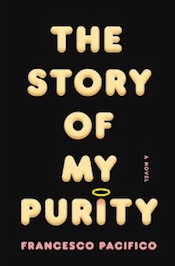Remember the punch line to Philip Roth’s Portnoy’s Complaint (1969)? At the end of the novel, the psychiatrist finally says, “So. Now vee may perhaps to begin. Yes?” There’s a similar gag near the end of Francesco Pacifico’s annoying novel, The Story of My Purity. Piero Rosini, the main character and the narrator, goes to see a masseuse at the recommendation of an older male friend. That friend tells him that he needs to make certain that the masseuse gives him a “happy ending.” Thus, the orgasms at the end of Roth’s and Pacifico’s novels connect their two main characters—though in remarkably different ways. Portnoy is on a quest for oral sex; Rosini turns down sexual opportunities because of his rigid Catholic upbringing and the fact that he won’t be unfaithful to his wife.
But we need to turn to the opening of Pacifico’s novel: “Napoleon. Nineteenth-century mental asylums were overrun with men convinced they were the Emperor of the French. Roaming about in crumpled, ungainly tricorne hats, they gave orders to invisible troops in their institutions’ English gardens. These men weren’t aberrations, just outliers on a spectrum of absolutely normal human behavior. We all have to believe we’re somebody. If we don’t give ourselves a face, if we don’t occupy some position, all action becomes impossible. At times we go too far and end up in an asylum, but generally we can’t do without imagination.”
Rosini is both an outlier and an imaginative bundle of neuroses. He’s 28 years old, married several years, and lives in Rome with his wife, Alice. Problem is that he’s more interested in his sister-in-law, Ada, than his wife, with whom sexual relations have soured. Moreover, he’s an editor at a Catholic publishing house that publishes rather traditional (orthodox) stuff. But then Rosini discovers a manuscript that argues that Karol Wojtyla (Pope John Paul II) was a Jew. Rosini convinces the  publishing house to bring out the book called The Jewish Pope, and because of his fixation on his subject, he also begins to think that he is a Jew. (Wasn’t it Jewish guilt that got Alexander Portnoy into his problems with sex?) Dangerous territory, of course, because now his Catholic upbringing is fused with Jewish orthodoxy. Rosini hardly knows where he’s going.
publishing house to bring out the book called The Jewish Pope, and because of his fixation on his subject, he also begins to think that he is a Jew. (Wasn’t it Jewish guilt that got Alexander Portnoy into his problems with sex?) Dangerous territory, of course, because now his Catholic upbringing is fused with Jewish orthodoxy. Rosini hardly knows where he’s going.
One thing is obvious. He’s obsessed with sex. He takes a temporary job with another religious publishing house in Paris, leaving Alice back in Rome. Women, drugs, masturbation, scatology. There are women all around him who try to seduce him, but he remains celibate. His older American friend tells him that all his problems come from his Catholicism and, to alleviate Rosini’s tensions, that friend, named Leo, begins calling the younger man with a Jewish name: “Look me in the face, Rosenzweil. You follow a religion based on a crazy man. This is why you’re crazy, Rosenzweil. You’re crazy, you’re stressed, you’re bitter, you’re nasty, you’re sad.” Leo is the man who will eventually tell Rosini to visit the masseuse. Get some release, for Christ’s sake.
The time in Paris stretches on to a couple of years. Still, he’s celibate, though women keep throwing themselves at him, demanding that he have sex with them. But Rosini’s celibacy has been exacerbated—not improved—by his feelings that he’s no longer a Catholic but a Jew. Finally, logic gets trumped as the thirty-year-old man rationalizes that if he is no longer Rosini (a Catholic) but Rosenzweil (a Jew), he is no longer bound by restrictions on his fidelity. Then things get further complicated because, after Alice’s visit and her return to Rome, Ada shows up, opening up the earlier feelings that Rosini has repressed for her all along.
When I first mentioned Pacifico’s The Story of My Purity, I referred to it as an annoying novel, which it is. But it’s also highly comic, sui generis (in spite of the parallels to Portnoy’s Complaint), and totally engaging. I kept asking myself why I was so interested in this schlemiel who kept turning away the multiple offers for sex, who sometimes even lets women (who are not his wife) sleep with him, without engaging in sex. In short, I kept reading—not because I assumed the crescendo of the story would be a wild sex scene—but because I was genuinely interested in Piero Rosini as a character.
That wait was well worth the time involved, because there’s an ending to The Story of My Purity unlike anything else I have ever encountered in fiction. Absolutely stunning. So give the novel a try. I doubt if you will be annoyed by the time you reach the conclusion. Plus, you have the benefit of Stephen Twilley’s wildly imaginative translation.
Francesco Pacifico: The Story of My Purity
Trans. by Stephen Twilley
Farrar, Straus and Giroux, 292 pp., $26
Charles R. Larson is Emeritus Professor of Literature at American University in Washington, D.C. Email: clarson@american.edu.